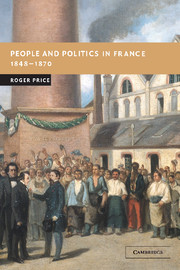Book contents
- Frontmatter
- Contents
- Acknowledgements
- List of abbreviations
- Introduction
- 1 Dominant classes: the social elites
- 2 Coming to terms with ‘democracy’
- 3 Aspiring social groups: the middle classes
- 4 Peasants and rural society: a dominated class?
- 5 Peasants and politics
- 6 The formation of a working class
- 7 The working-class challenge: socialisation and political choice
- Conclusion
- Select bibliography
- Index
3 - Aspiring social groups: the middle classes
Published online by Cambridge University Press: 28 August 2009
- Frontmatter
- Contents
- Acknowledgements
- List of abbreviations
- Introduction
- 1 Dominant classes: the social elites
- 2 Coming to terms with ‘democracy’
- 3 Aspiring social groups: the middle classes
- 4 Peasants and rural society: a dominated class?
- 5 Peasants and politics
- 6 The formation of a working class
- 7 The working-class challenge: socialisation and political choice
- Conclusion
- Select bibliography
- Index
Summary
INTRODUCTION: PROBLEMS OF DEFINITION
In spite of differences in lifestyle and political behaviour, the elites analysed in the previous two chapters were the most coherent of the social groups whose politics we are to consider. They were composed of relatively small numbers of people, adept at organisation and determined to protect their property, status, and influence. The ‘middle classes’ are far more difficult to define and their political behaviour is especially diverse. Moreover, whilst senior government officials – our privileged observers – were well informed about the activities and attitudes of elites to which they belonged themselves and, to a lesser extent, about the rural milieu in which they frequently resided, or even the workers who attracted attention because they were believed to pose a major threat to social order, they were less conversant with the middle classes.
However, contemporary observers certainly recognised their existence, employing terms such as bourgeoisie, classes moyennes, and petite bourgeoisie in more-or-less haphazard fashion. Used as an adjective the word bourgeois frequently had pejorative connotations – vulgarity, lack of taste, meanness, and timidity. This was certainly the case in Daumier's caricatures, and in the novelist Flaubert's contempt for philistinism. More positively, it might denote a commitment to work, thrift, property, order, liberty, and civil equality. According to the definition in the second edition of Pierre Larousse's Grand Dictionnaire published in 1867 the term bourgeoisie was applied to a member of the classe moyenne.
- Type
- Chapter
- Information
- People and Politics in France, 1848–1870 , pp. 121 - 171Publisher: Cambridge University PressPrint publication year: 2004



